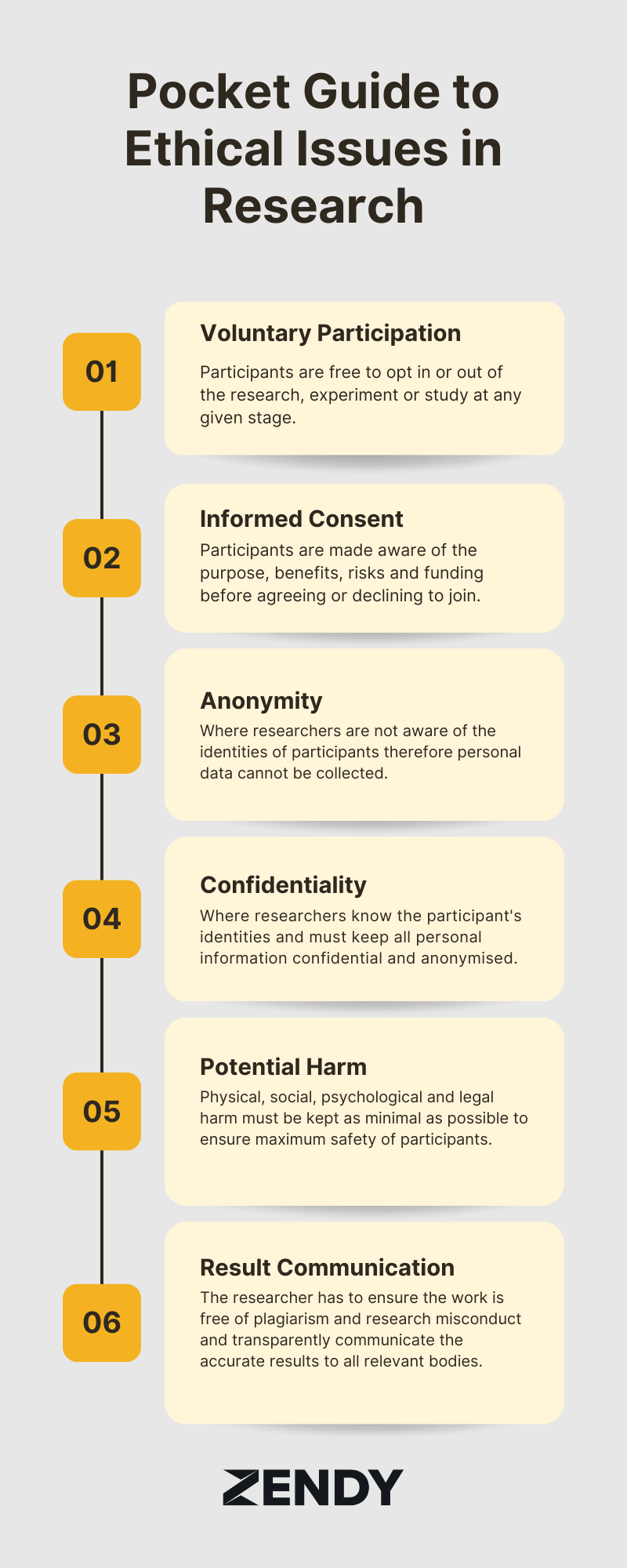
Within the ever-evolving sphere of academic and scientific research, ethical considerations play an imperative role. Research ethics are a set of principles that guide research, study, or experiment design and process; they serve as a code of conduct for scientists and researchers to abide by when collecting data from people. Transparently communicating how a study followed ethical guidelines is beneficial for both the researcher and participant; the guidelines ensure the participant’s right to privacy is protected, while also enhancing research validity and maintaining scientific integrity.
Why are ethics important in research?
Ethical considerations in research are established to ensure that the rights and welfare of research participants are appropriately protected, and all research designs involving living beings are reviewed by an ethics committee prior to the execution; this is done to ensure all ethical standards are met.
Following ethics shows objectivity in research studies and experiments, the absence of harm combined with efficient result transparency gives the study credibility as well. Moreover, ethical research models and experiment designs attract more funding because research integrity and transparency are essential in gaining support to execute research. Finally, the standard ethics in research are also put in place to increase collaborative work across disciplines and institutions.

- Voluntary Participation
When scouting and briefing volunteers for a research study, it is imperative to clarify that there are no negative consequences of withdrawing from the study. Voluntary participation is an ethical principle protected by international law and many scientific codes of conduct.
- Informed Consent
All potential participants should receive and comprehend all the information about the study or experiment. The participant debriefing should include the following:
- What is the study about?
- Risks and benefits of participating
- Timeline of study or experiment
- Contact information and institutional approval number of the research supervisor
- Right to withdraw at any given point in the study
- The information withdrawal procedure
All of this information should be clearly mentioned and explained in a debriefing document which the participants should sign. It is important for all this information to be thoroughly comprehended by participants hence the material should be translated for those with limited English.
- Anonymity
In a research study, anonymity can only be guaranteed by not collecting any personally identifiable information. An alternative to anonymising data is to generate data pseudonyms and replace personal information with these pseudonym identifiers instead.
- Confidentiality
Participant confidentiality has to be maintained properly before, during and after the study. The information has to be stored safely during collection, analysis and utilisation. For example, all digitised files must be password protected and only approved researchers can access these databases. For cases in which confidentiality cannot be guaranteed, this must be thoroughly communicated in the debriefing phase.
- Potential Harm
Any kind of harm during a study should be minimised. However, the researcher would need to consider all aspects of liability to debrief participants appropriately.
- Psychological harm: sensitive questions or tasks that can trigger negative emotions such as anxiety or shame
- Social harm: participation can involve social risks, public humiliation or stigma
- Physical harm: any pain or injury that can result from study procedures
- Legal harm: reporting sensitive data could lead to legal risks and potential breaches of privacy
- Result Communication
Researchers should remember that good scientific research is honest and credible, as this keeps results as transparent as possible. There are 2 issues that can come from inaccurate result analysis and communication:
- Plagiarism: the researcher should be vigilant to not commit plagiarism or self-plagiarism as this can benefit the researcher from presenting these findings and concepts as “new”
- Research misconduct: falsifying or fabricating data which is considered academic fraud
In conclusion, ethical considerations in research contribute to responsible research. Embracing principles such as honesty, integrity, transparency, fairness, and respect not only ensures the credibility of academic work but also fosters a culture of trust and collaboration within the scholarly community. As we navigate the ever-evolving landscape of academia, it is imperative to remain vigilant in upholding these ethical standards. By doing so, we not only contribute to the advancement of knowledge but also serve as ethical role models for the next generation of scholars, shaping a brighter and more ethically grounded future for academia.
